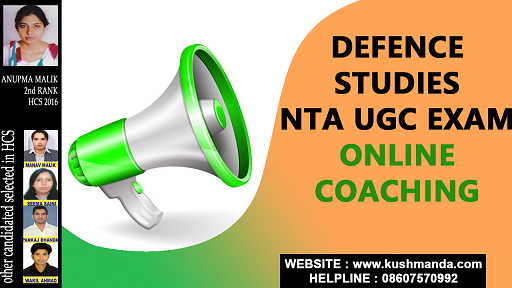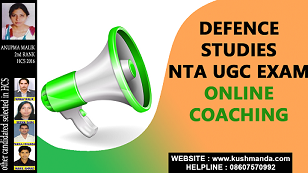Defence Studies NTA UGC Online Coaching
Defence Studies NTA UGC Online Coaching
Comprehensive Course for your Defence Studies Preparation (Paper I & Paper II)
• 300+ Live Classes for Complete Conceptual Clarity
• Complete Study Material (Printed )
• 3000+ Practice Questions with 15+ Weekly Tests to Practice
• 10+ Mock Tests
Duration :- 3-4 month
Fee :25000/-
For More Details Contact Us-86075-70992, 97289-26678
COURSE DETAILS : PAPER I & PAPER II
| Defence Studies |
- STARTS : Admission Open
- TIMINGS: Morning Batch 08:00am – 010:00am (Monday – Friday),
- Evening Batch : 05:00 pm – 07:00 pm (Monday-Friday)
PAPER I
|
“for free demo online live class call us 8607570992,9728926678″
PAPER II
|
“for free demo online live class call us 8607570992,9728926678″
HELPLINE: 8607570992, 9728926678
KUSHMANDA IAS HCS ACADEMY
100,BLOCK C,TDI CITY, PANIPAT,
HARYANA
DEFENCE STUDIES SYLLABUS
Subject : DEFENCE AND STRATEGIC STUDIES
UNIT- I
THEORIES AND CONCEPTS
1. Defence and Strategic Studies : Assumptions and Approaches.
2. The Concepts of Nation:
State and Nation – State, Theories and Elements of State
National Power and its Components
3. Key Concepts of National Security: Defining National Security, National Defence and National Interest, National Character and Evolution-of the National Security concept in the 20Century and Beyond.
4. National Security Concerns of Major Powers, Middle Powers and Small Powers
5. National Security Structures: Armed Forces, Intelligence Agencies, Police Forces, Decision-Making Structures, etc.
6. National Security Environment: Internal and External
7. Defence, Foreign, Security and Domestic Policies; Concept formulation, objectives and linkages.
8. Military Alliances and Pacts, Peace Treaties, Defence Cooperation, Strategic Partnership and Security Dialogue.
9. Non – Alignment, Balance of Power, Collective Security and Balance of Terror – Concept, Development and Relevance.
10. Deterrence and Détente: Concept and contemporary relevance.
UNIT – II
STRATEGIC THOUGHT
1. Contribution of Sun Tzu,
2. Kautilya,
3. Machiavelli,
4. Jomini,
5. Carl von Clausewitz,
6. General Giulio Douhet
7. W.Mitchell,
8. J.F.C.Fuller,
9. Capt.B.H.Liddell Hart,
10. Marx, Lenin, Mao Zedong and Che Guevara.
11. Nuclear Deterrence: Andre Beaufre, Henry Kissinger and K. Subrahmanyam.
12. Thoughts of Gandhi and Nehru on Peace, Security and Development.
UNIT – III
WAR AS AN INSTRUMENT IN INTERNATIONAL RELATIONS
1. Theories and causes of War.
2. Principles of War.
3. Contemporary Warfare : Conventional Warfare in Nuclear age, Limited War, Revolutionary Warfare, Low Intensity Operations, Guerilla Warfare, Insurgency and Counter – Insurgency.
4. Armaments : Arms Race, Arms Aid, Arms Trade, Arms Proliferation, Proliferation of Small Arms
5. Military Alliances and Pacts, Peace Treaties, Defence Cooperation, Strategic Partnership and Security Dialogue.
6. Terrorism : Concept and kinds (National, International and Cross border).
7. Conflicting Ideologies : Militarism, Nationalism, Fundamentalism, Separatism, Irredentism.
8. Concept and Elements of Deterrence: Nuclear & Conventional.
9. Evolution of Global Nuclear Doctrines
10. Democratic Peace Theory
UNIT – IV
WMD, NUCLEAR PROLIFERATION AND NATIONAL SECURITY
1. Basic Concepts and Theory
(i) Concepts of Disarmament & Arms Control
(ii) Objectives and Conditions of Disarmament
(iii) Elements of Arms Control Mechanisms: Agreements, verification, inspection, control.
(iv) Approaches to Disarmament & Arms Control
2.Historical Survey of Disarmament Efforts:
(i) Under the League of Nations
(ii) Under the United Nations
(iii) Unilateral, Bilateral and Multilateral approaches
(iv) Role of Non-aligned Nations in Disarmament Negotiations
3. Weapons of Mass Destruction: Nuclear, Chemical & Biological Weapons.
4. Nuclear Arms Limitation Nuclear Arms Control Treaties.
5. Chemical weapons Convention and Biological Weapons Convention
6. Concept of Non-proliferation, NPT, CTBT, PTBT MTCR FMCT, & other treaties
7. Nuclear Export Control Regimes
8. New Challenges and Responses – Missile Defense, Cooperative Threat Reduction and G-7 Global Partnership
9. Disarmament & Arms Control and Economic Development
10. Terrorism and Nuclear Proliferation.
11. Concept of Star Wars and NMD
UNIT – V
GLOBAL SECURITY CONCERNS
1. End of cold war and emergence of new world order.
2. Proliferation of Military, Nuclear and missile capabilities
3. Environmental Issues : climate change and Global Warming, Desertification,
Acid Rains, Industrial Pollution, Deforestation
4. Organized Crimes : Money Laundering, Narco – trafficking , Human
Trafficking and small arms proliferation.
5. Migrants and Refugees: (a) Causes (b) Illegal migration and border
management (c) Problem in South Asia (d) Role of International
Committee of Red Cross and UN High Commission for Refugees.
6. Global Security Concerns: Palestinian-Israeli conflict & Arab Spring,
Developments in Central Asian Republics (CARs), Rise of Fundamentalism, Challenges in Korean Peninsula, Taiwan and Power Rivalry in South China Sea.
7. Problem of System of Governance and Human Rights
8. Food Security, Energy Security and Water Security problems in modern era.
9. Millennium Development Goals.
UNIT – VI
INDIA’S SECURITY CONCERNS & POLICIES IN CONTEMPORARY INTERNATIONAL SCENARIO
1. Genesis of Sino-Indian Relations
2. The Boundary Dispute, Sino- Pakistan Nexus, OBOR and CPEC, China and
India- Military Balance, Chinese Policy towards South Asia
3. Rise of India and China: Cooperation and Competition, Chinese Interests in Indian Ocean and South China Sea
4. Strategic Dimension of India- Pakistan Relations: Genesis of India-Pakistan Conflict, Indo-Pak Military balance, The Kashmir Question, Pakistan Sponsored Terrorism, Pakistan’s Nuclear Strategy, The Powers Structure of Pakistan, Contentious. Issues: Siachin, Sir Creek, River Waters, etc.
5. India and South Asia: Issues and Challenges for Regional Cooperation.
6. Making of India’s Defence Policy since Independence: (a) Threat perception,
assessment and preparedness (b) Political and military lessons of 1948,
1962, 1965, 1971, 1999 wars (c) Future trends
7. India’s Look East and Act East Policies, Indo- Pacific Cooperation, Strategic
Partnerships.
8. India’s maritime security and strategy in 21 century: (a) Indian Ocean (b) Asia-Pacific region(c) Security of Sea Lanes, India’s Maritime Strategy for the 21st Century.
9. India’s Defence Doctrines and Strategies including Nuclear Doctrine
10. Higher Defence Organization of India.
UNIT – VII
ISSUES IN CONFLICT RESOLUTION
1. Origin, Type and Structure of Conflict.
2. Ideologies and International conflicts.
3. Role of United Nations in Conflict Management and Re – Structuring of UNO
4. Techniques of Conflict Prevention
5. Conflict Management : Pacific Solutions of International Disputes, Coercive
methods.
6. International Humanitarian Laws and Laws of Armed Conflicts.
7. Confidence Building Measures : Concept, kinds and utility.
8. IGOs & NGOs in Conflict Resolution: Peace Making, Peace Keeping and
Peace Building.
9. Gandhian Philosophy on Peace and Non-violence
10. Nehruvian approach to National Security and Cooperation
UNIT – VIII
DISASTER MANAGEMENT AND NATIONAL SECURITY
1. Basic Concept & meaning of Disaster, Introduction to terminologies
associated with Disaster and National Security: Natural and Manmade,
Vulnerability, Risk etc., Identifying various types of Disasters.
2. Natural Disaster and Human Induced Disaster: Floods, Cyclone, Earthquake,
Tsunami – WMD Disaster – Disaster associated with various industries
3. Study of Disaster in India / Around the World: Case Studies: Tsunami 2004,
Bhopal Gas Tragedy, Chernobyl, Fukushima, Uttarakhand etc.
4. Disaster Management : Meaning, Association and Distinction with related
concepts like Disaster Mitigation, Response, and Recovery, Relief, and
Reconstruction
5. Institutional Mechanism for Disaster Management in India: Role of Armed
Forces, Central and State Governments, NGO, National Disaster Management Authority, Indian National Centre for Ocean Information Services.
UNIT – IX
DEFENCE ECONOMICS
1. Economic Theories of Defence.
2. Sustainable Development: Challenges & Responses.
3. Basics of Defence Planning, Determinants of Defence Expenditure.
4. Defence Budgeting.
5. Economic Causes of War.
6. Economic Warfare in modem times.
7. Economic Problems of Post War reconstruction.
8. National Security and International Trade regimes (WTO, TRIPS, TRIMS,
FTA’s NAFTA, SAPTA, & NSG).
9. India’s role in Regional and Global Economic Forums and Organizations.
10. Geo-economics and its Implications for global/regional economic stability
UNIT –X
SCIENCE & TECHNOLOGY AND NATIONAL SECURITY
1. Broad Survey of Technological Changes from Industrial Revolution to
Information Revolution.
2. India’s Civil Nuclear and Space Programs, India’s Energy Scenario.
3. Research and Development :
Relevance of Science and Technology in National Security.
Impact of Information Technology; Revolution in Military Affairs (RMA).
Choice of Weapon Systems.
4. Impact of Economic Liberalization and Globalization :
Defence Production in India ( Role of DPSU’s and Ordnance factories).
Defence and Development and Peace & Development Dichotomies.
5. Issues of Mobilization of Resources during War and Peace.
6. Military Industrial Complexes.
7. Transfer of Technology : Dual use and critical technologies and their impact
on national security.
8. Interdependence and Cooperation at Regional and Global levels.
9. Cyber Security : Vulnerabilities of Information technology and internet, Need
and importance of cyber security, Different kinds of cyber security
vulnerabilities, Cyber wars including propaganda, measures for cyber
security- Technology, laws and regulations, global issues in cyber security.
10. Social Media and its Impact on National Security- Global reach with rapid
speed for propaganda and indoctrinate misinformation and rumour mongering
cadre recruitment and use of social networking sites for mobilizing public
opinion.


















